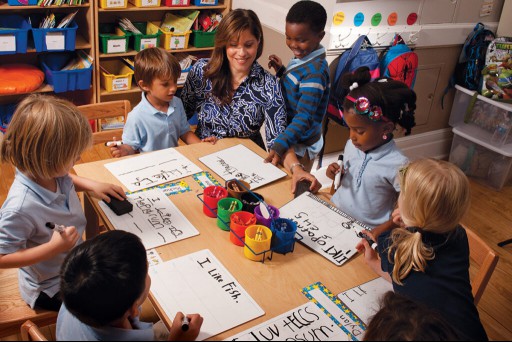Children that receive the best early childhood education and care have the best start in life. It offers significant chances for growth and learning. Your child can learn new habits, make friends, and become more independent with the support of early childhood education and care. It facilitates their adjustment to school as well. To locate high-quality early childhood education and care services in NSW, use the ECE Finder tool External link.
Helping young children’s brain development

Both a child’s environment and genes have an impact on their brain development. With almost a million new brain connections formed every second during the first few years of life, babies are wired for learning from birth. The early years are crucial because a child’s environment and interactions with others around them have a significant impact on how their brain develops.
The development of early language abilities and higher cognitive processes comes after the routes for vision and hearing. The words that a child knows often quadruples between the ages of two and four. As kids become older, these connections are more intricate and affect how the brain develops, resulting in early development of beneficial learning behaviors.
Studies indicate that kids who take part in high-quality preschool programs have a higher probability of bringing the social, cognitive, and emotional competencies required for further learning to school. These advantages go far beyond elementary education. Moderate levels of participation in high-quality early childhood education have been associated with higher levels of social skills, employment, and academic performance.
Significance of the initial two thousand days of existence
The goal of the NSW government’s child development initiatives is to better support all children in achieving the best start in life by enhancing the lives and experiences of parents and families during the first 2000 days of their child’s life.
View the detailed instructions for parents and caregivers of young children in NSW who have not yet begun primary school.
The public awareness campaign “Grow to Learn, Learn to Grow” has also been introduced by the NSW Department of Education. In addition to highlighting the advantages of early childhood education, the campaign gives families the knowledge they need to enroll their kids in high-quality programs.
Establishing a friendship
Most kids desire to play with other kids their own age between the ages of three and five, and they are beginning to understand other people’s emotions. Children learn how to play with others at this age, and they may even have a “best friend.”
Children are urged to play and share with their classmates in early childhood education and care. They gain valuable interpersonal skills from these encounters, such cooperation and empathy, which will help them get along with others in preschool and later.
Children who spend time with their peers begin to comprehend each other’s emotions and learn how to incorporate ideas from others into their play. Because they are inherently egocentric, young toddlers may find it difficult to master social skills like empathy. Fortunately, they may pick up a lot of knowledge simply observing and engaging with their peers. These social skills taught to children in their early years can benefit them in making friends for the rest of their lives.
Getting self-sufficient
Early childhood education and care programs sometimes represent the first substantial time that many children are away from their families. Children can gain confidence and explore their identities by being in a new setting and away from home.
Between the ages of three and five, children learn critical self-regulation abilities as part of their growing independence. These abilities could include sharing, paying attention, and taking shifts. Toddlers can exhibit self-regulation, for instance, by waiting to play with a toy or by focusing on a conversation.
Self-regulation abilities are crucial for children’s growth and self-understanding, as well as their ability to make friends and gain confidence and independence. Healthy self-regulation techniques can be modeled by parents, caregivers, and early childhood educators.
Acquiring new habits
Your child can acquire the ability to adjust to a new routine outside of the house by participating in early education and care. A child’s emotional and cognitive development can benefit greatly from routines, and being aware of what to expect makes them feel safe and at ease.
Establishing routines can assist kids in controlling their expectations of their surroundings and lessen negative behaviors like throwing fits. Early childhood educators and teachers will combine indoor and outdoor, child-directed and adult-directed activities while creating daily routines.
In order to account for naps, special needs or medical requirements, children’s attention spans, and other age-based requirements, routines are also designed with their ages in mind.
Assisting in the adjustment to school
Your child’s transition to primary school is facilitated by early childhood education. Children are prepared through a variety of informal and official means, including participating in Transition to School events. Positive school transitions increase a child’s sense of comfort, relaxation, and motivation to learn. This fosters their sense of belonging in the school and helps them build good relationships with other students and teachers.
Comment